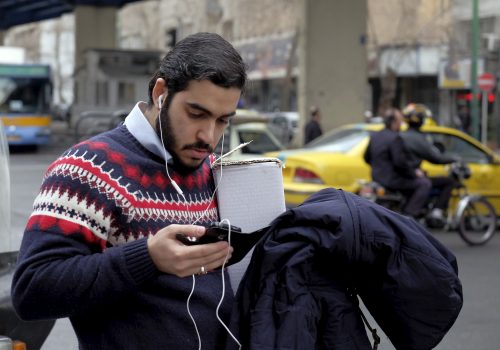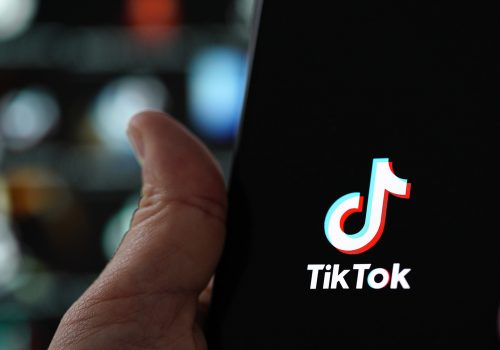Baby bottle coffee drinks and censorship: The ultimate guide to Arab TikTok
In their loungewear, Addison Rae and her family perform the macarena to Hadal Ahbek by Jordanian singer Issam Alnajjar.
Hadal Ahbek (“I’ll keep loving you”) is just one of many Arab songs that gained popularity on TikTok—one of the hottest video-sharing social media apps right now with more than 689 million monthly users worldwide. Dozens of top TikTok influencers such as Rae—who has over 77.1 million followers—created TikTok videos remixing Alnajjar’s song, which has since gone viral in the west and, of course, the Middle East. Now Alnajjar’s single is a chart-topper on Spotify.
Since TikTok gained popularity in 2017, the app has stirred up significant controversy. In the US there are even talks of a potential ban given the security and data privacy concerns for Americans who download the Chinese-owned platform. In August 2020, former US President Donald Trump called it a national security threat and issued an executive order to ban TikTok, but a federal judge halted the decision. Despite controversy, TikTok has only continued to gain popularity on a global scale, including in the Arab world—the Gulf in particular—giving Arab users another platform to express themselves creatively—albeit with hurdles.
Like any social media platform, Arab youth quickly caught on to the trendy platform. According to Route Note, by March 2020, Saudi Arabia ranked eighth in terms of worldwide users, with 9.7 million Saudis on the platform. The United Arab Emirates (UAE) ranks eleventh globally in terms of influencers, with more than thirty-four thousand Emiratis creating viral content. TikTok ranks in the top ten most downloaded apps on the Google Play and Apple Store in all six Gulf Cooperation Council countries. Thus, it is unsurprising that TikTok built a regional headquarters in the UAE in 2018 to join Facebook and Twitter.
When TikTok entered the ring, Arab beauty influencers flocked to the new platform to maintain engagement with their followers. Huda Kattan—HudaBeauty founder and Dubai-based Instagram influencer with over 47.8 million followers—quickly migrated to TikTok to share her beauty tips on the new platform. Others found creative ways to use the app to spread cooking tutorials or showcase their pranks to challenge stereotypes, like Adam Mazen, a 17-year-old from Jordan who was born with Down syndrome.
The app has become so prevalent in the Gulf that interactive “TikTok Booths” have popped up in UAE malls as attractions for visitors to engage with popular content creators on the platform. Dubai’s Department of Tourism and Commerce Marketing was quick to embrace the new app with the launch of #ThisIsDubai challenge in the summer of 2019, encouraging users to creatively document their travels on the platform as a larger part of the #TikTokTravel campaign that stretched across one hundred countries. And amidst the beauty gurus and travel influencers, political leaders like Sheikh Mohammed bin Rashid Al Maktoum, UAE prime minister and ruler of Dubai, have even joined the platform.
The app is now so popular in the Arab world that TikTok recently announced the first “TikTok House” in the Middle East in January, which will be based out of Amman, Jordan. Better known as Beitna, the “TikTok House” provides top influencers with a creative environment—both physical and virtual—to film videos that drive viral trends. Influencers are selected to live in Beitna, encouraging creative collaboration. Beitna emerged after the popularity of multiple US-based TikTok houses, such as HypeHouse—home to some of the top US influencers.
In March, it was announced that the app is partnering with Extreme E, an off-road electric car racing championship, to create video content.
In addition to lip-syncing, cooking hacks, hijab styling tips, and countless cat videos, TikTok has provided a relatively unregulated space for Arab users to speak on political and social issues. Its viral nature allows users to quickly reach large audiences and shed light on current events. After the Beirut Port explosion in Lebanon on August 4, 2020, TikTok users and influencers worldwide helped raise more than $1 million dollars for the Lebanese Red Cross to provide aid to the people of Beirut. This is just one instance of the platform’s ability to raise awareness and garner support.
Although TikTok provides a platform for creative expression and political speech, repressive governments around the world attempt to censor users—and the Middle East is no exception. Those in charge are fearful of the app’s quick-sharing nature, which can allow anything from popular dances to government slander to spread rapidly.
Female content creators in the Arab world are often the first victims of censorship for breaking traditions. Two notable instances were the arrests of Egyptian TikTok influencers Mowada al-Adham and Haneen Hossam, who were convicted and sentenced to two years in prison in July 2020 for “violating family values” and “indecency” in their viral TikTok videos that featured lip-syncing and dancing. Their jail sentences were overturned in early January 2021, but the female TikTok stars still face fines of nearly $19,000. In Egypt, nine women in total were arrested for posting videos of themselves dancing and lip-syncing.
In May 2020, an expat in Dubai posted a TikTok video of himself sneezing into a UAE banknote and throwing it onto the floor. After receiving negative comments and being reported to the police, he was promptly arrested and accused of insulting state institutions and “harming” the country’s reputation.
Baby bottle drinks are the latest TikTok trend to receive criticism. First served at Einstein Café in Kuwait, the flashy cerelac milkshakes and iced coffees captured the attention of youth across the Gulf, who then posted videos of the drinks on TikTok. However, many criticized the trend, claiming that it was against Islam and “local culture and traditions” for using colorful baby bottles meant for infants (there was also concern of spreading COVID-19, given that customers were bringing in their own bottles).
Foreign governments also attempt to censor content on TikTok with the restriction of hashtags and open criticism of viral trends, which limits free expression on the popular social media platform. The app already “shadow bans” or restricts the visibility of a user or hashtag in a search of sensitive content, including LBGTQ hashtags in Arabic.
It’s worth noting that TikTok is not the first platform to endure censorship from Arab governments. Many websites and social media and messaging applications—such as Skype, SnapChat, and Telegram—are blocked in certain Arab countries, particularly in the Gulf. This may account for the nearly 45 percent increase in Virtual Private Networks downloads in countries like the UAE, Saudi Arabia, Oman, and Qatar.
Even though TikTok is the dominating app among Arab youth, Clubhouse is making its way to the forefront. The invite-only app with its drop-in audio chat rooms has gained significant popularity in the Gulf, especially Saudi Arabia. As Eman Alhussein, a nonresident fellow at the Arab Gulf States Institute in Washington, noted, “Clubhouse is providing a much-needed space for contesting views and continuing debates that have been suspended for years in the Gulf.”
While Clubhouse provides platforms for niche communities and intimate conversation, the app faces many similar security and censorship challenges as TikTok. For example, although the app forbids the recording of conversations, numerous instances have emerged of screenshots of participations and audio recordings being leaked online to name and shame users. Criticized by the Arab world for its “taboo” chat rooms, the app was recently banned in Oman for not having an “operating permit.” Jordan and other Middle East countries have also made similar moves to limit access.
There has yet to be an official ban of TikTok, but many countries—including Saudi Arabia—have toyed with the idea, given the potential security concerns and the ongoing effort to censor content in general. For now, Arab youth will continue to embrace the creative short-form video platform and dodge censorship.
It also remains to be seen whether the buzz around TikTok and Clubhouse will continue post-pandemic, when users have less time to spend on their phones, whether that be to perfect their dances or discuss important issues such as women’s rights.
Although its future is unclear, TikTok will continue to surge among Arab youth—until a new hot social media app emerges.
Samantha Treiman is the media and communications coordinator for the Atlantic Council’s Middle East Programs. Follow her on Twitter and TikTok: @SamanthaTreiman and @SamTrei.
Image: Adam Mazen, 17-year-old Jordanian Tiktok star who was born with Down's Syndrome, cooks a meal for his followers as his brother films him, at their home in Amman, Jordan August 25, 2020. Picture taken August 25, 2020. REUTERS/Muhammad Hamed


